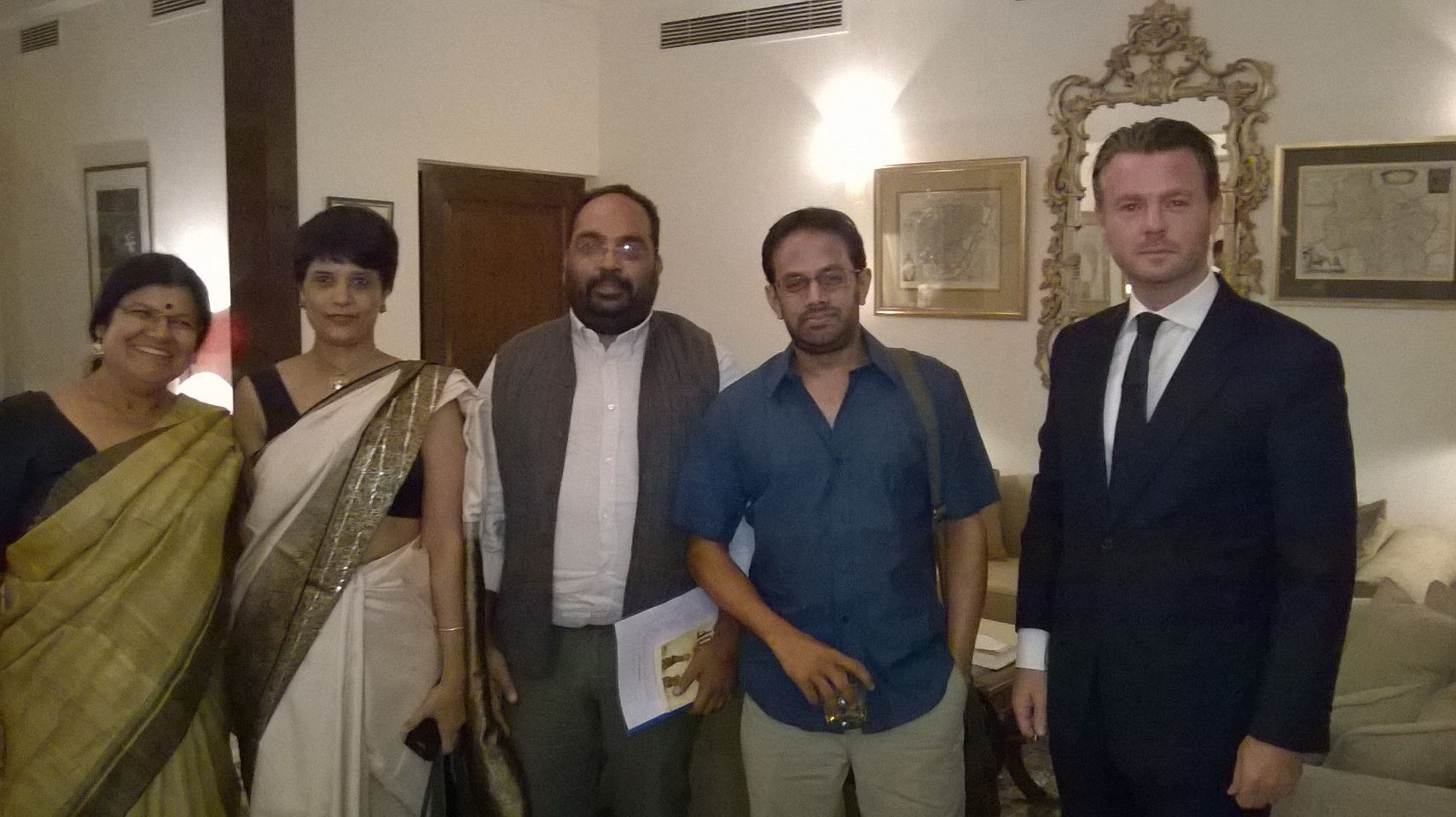Musings: On the Westland and Amazon partnership in India ( 25 Feb 2016)
 On 11 February 2016 it was announced that Amazon had bought a 26% stake in Westland Publishers for $1.9 m or Rs9.5 crores. ( http://rtn.asia/t-t/17345/amazon-acquires-stake-in-tatas-publishing-unit-westland and Hindu Businessline http://m.thehindubusinessline.com/companies/amazon-picks-up-26-stake-in-tata-publishing-arm-westland-for-rs-95-cr/article8224355.ece ). Under the definitive agreements signed by Trent, Amazon.com NV Investment Holding LLC and Westland, Amazon will have a right to appoint a director on the Board of Westland and also have the option to acquire the remaining 74 per cent of shares at a later date. In a statement, Westland said the investment by Amazon will enable it to expand its international reach and scale their physical and digital book businesses.
On 11 February 2016 it was announced that Amazon had bought a 26% stake in Westland Publishers for $1.9 m or Rs9.5 crores. ( http://rtn.asia/t-t/17345/amazon-acquires-stake-in-tatas-publishing-unit-westland and Hindu Businessline http://m.thehindubusinessline.com/companies/amazon-picks-up-26-stake-in-tata-publishing-arm-westland-for-rs-95-cr/article8224355.ece ). Under the definitive agreements signed by Trent, Amazon.com NV Investment Holding LLC and Westland, Amazon will have a right to appoint a director on the Board of Westland and also have the option to acquire the remaining 74 per cent of shares at a later date. In a statement, Westland said the investment by Amazon will enable it to expand its international reach and scale their physical and digital book businesses.
With an estimated market segment of INR 10,000 crores, India ranks seventh in overall publishing and third after  the US and UK in English language publishing. According to a recent FICCI Publishing Sector Report, book publishing in India is growing at a compound annual growth rate of approximately 30 per cent. With an estimated 600 million adult readers in the country and a growing young reader base (15-25 yrs) of 350 million, the readership in India is expected to continue growing.
the US and UK in English language publishing. According to a recent FICCI Publishing Sector Report, book publishing in India is growing at a compound annual growth rate of approximately 30 per cent. With an estimated 600 million adult readers in the country and a growing young reader base (15-25 yrs) of 350 million, the readership in India is expected to continue growing.
This is a significant development in the Indian publishing industry.
Westland Books has a tremendous stable of commercially successful authors, a strategy they have been in investing in steadily in recent years. Some of these are: Amish Tripathi, Ashwin Sanghi, Ravi Subramanian, Preeti Shenoy, Anuja Chauhan, Rashmi Bansal, Rujuta Diwekar, Devdutt Pattanaik, Dheeraj Sinha, Kiran Doshi, Nilanjan Mukhopadhyay, Ashok Banker and Satyajit Das. Their books sell lakhs of units. ( 1 lakh = 100,000) Their pre-order sales are phenomenal too. These writers have a star power and a fan following that has been unprecedented in the publishing history of India but they are also expensive to retain. (See: 4 March 2013. http://www.ndtv.com/india-news/writer-amish-tripathi-wins-record-1-million-advance-for-south-asia-rights-515121 and 19 March 2015, http://scroll.in/article/714606/why-anuja-chauhan-moved-from-harpercollins-after-eight-years-and-three-bestsellers ) The immediate impact on the publishing firm has been to streamline operations, not just in terms of structural readjustments but also exploring alternative channels of revenue, while growing too. Westland is primarily an English-language publishing firm but has an Indian translations programme with its strategic partnership with Yatra Books. In fact in early February, the Oriya translation of Amish Tripathi’s book had been announced.
Amazon too has been in India for a while. It is better known for its online retail store and self-publishing programme, Kindle Direct Programme or KDP. (It has organised very popular KDP roadshows in India too, proving the Amazon brand is well-known locally.) By investing in an Indian publishing firm, Amazon firmly establishes itself into the literary landscape. Plus, evolving in this manner seems to be in keeping with Amazon’s highly successful Seattle-based publishing programme especially translations. In fact it is significant that press release quoted Sarah Jane Gunter, Director, Amazon Publishing and not Jeff Bezos or an Amazon India representative.
The rising significance of translations in publishing worldwide can no longer be ignored. In April 2015, the New York Times published an article Amazon’s translation programme AmazonCrossing as the most successful publishing programme, leaving even the biggest MNCs and specialist independent presses far, far behind. ( 29 April 2015 http://www.nytimes.com/2015/04/30/arts/international/who-is-the-biggest-publisher-of-foreign-literature-in-the-us.html?_r=0 and Alex Shephard in the New Republic on 19 Oct 2015,” How Amazon quietly became the largest publisher of translated literature” https://newrepublic.com/article/123150/americas-biggest-publisher-literature-translation-amazon ) . According to Chad Post while doing the calculations for his annual translation database report in December 2015, he realised that AmazonCrossing had the maximum number of titles in the year. It was 75 titles which was three times more than the next publisher. He maintains the wonderful Three Percent blog on the University of Rochester website. ( 6 December 2015, “Translation Database Updates: AmazonCrossing is the Story” http://www.rochester.edu/College/translation/threepercent/index.php?id=16182#fn14513631225664e866d0983 ) In fact, in Oct 2015, Amazon invested USD $10 m into AmazonCrossing as a commitment over the next five years to increase the number and diversity of its books in translation.
Westland stands to gain twofold – a significant minority provides good financial investment and they will be able to leverage the international area strategically particularly Indian diaspora book market. As an author said to me upon hearing of this announcement, “Now it may be possible for Indian authors to organise book tours abroad.” Whereas Amazon is able to leverage a significant portion of the 600m readership in India with plans to expand in the future. The Indian book market is showing a healthy growth rate across genres. The estimated valuation of Westland with this deal is Rs 38/40 crores – a substantial sum for an Indian publishing firm when its most valuable assets are its authors and backlist. Sarah Gunter too with her experience in children’s literacy programmes will provide expertise into a book market where the estimated readership between ages 15-25 is 350 million. Also, Amazon too, like others in the publishing industry, are exploring omni-channel retailing. Having opened their first brick-and-mortar store in Seattle recently, followed by San Diego and it is speculated that they have another 400 planned in USA, it comes as no surprise when Satabdi Mishra of Walking BookFairs posted on her Facebook wall on 2 February 2016, “Why are Amazon and Snapdeal calling a small independent ‘real’ bookshop for possible collaborations?” Another good reason to invest in a local book publishing programme?
“We are very excited about this investment from Amazon and what it means for Westland, our customers and authors,” said Gautam Padmanabhan, CEO of Westland. “Amazon’s roots are in books and they remain a major part of their business – this investment from a company with such deep experience in books, global reach and exciting digital platforms will help us take our Indian authors and their works globally.”
“We are delighted that our investment in Westland will help their authors reach a broader audience worldwide,” said Sarah Jane Gunter, Director of Amazon Publishing. “Our investment in Westland continues Amazon’s commitment to innovating and investing heavily on behalf of customers in India – it’s still very much Day One.”
Amazon too, like others in the publishing industry, are exploring omni-channel retailing. Having opened their first brick-and-mortar store in Seattle, followed by San Diego and it is speculated that they have another 400 planned in USA. Hence it comes as no surprise when Satabdi Mishra of Walking BookFairs posted on her Facebook wall on 2 February 2016, “Why are Amazon and Snapdeal calling a small independent ‘real’ bookshop for possible collaborations?”
So far it is a win-win scenario for Westland and Amazon.
25 February 2016




